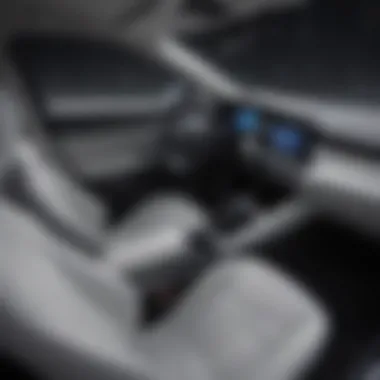Hyundai's Electric Cars: Innovation and Future Insights


Intro
Hyundai's recent venture into the electric vehicle (EV) space is reshaping perceptions within an industry evolving at a rapid pace. The South Korean automaker, known for its reliable and affordable cars, has shifted gears—deep into the electrifying world of sustainable transportation. This article delves into Hyundai's electric models, exploring their innovations and performance, while also unpacking the challenges they face amidst an increasingly competitive landscape.
Electric vehicles have garnered significant attention in recent years. Climate change and the pursuit for greener technologies have pushed both manufacturers and consumers to reconsider traditional gasoline-powered cars. Hyundai stands at the forefront of this movement, crafting vehicles that not only meet regulatory demands but also align with consumer desires for efficiency and sustainability.
Through this piece, we'll take a closer look at Hyundai's journey in the EV sector. From analyzing specific models and their distinct features to assessing emerging industry trends and consumer shifts, we're setting out to construct a comprehensive overview. Let's buckle up and navigate through what makes Hyundai a pivotal player in the electric car realm.
Hyundai's Commitment to Electric Vehicles
Hyundai's commitment to electric vehicles transcends mere market participation; it reflects a broader ethos guiding this automaker toward a sustainable automotive future. With increasing global concern about environmental degradation and climate change, Hyundai recognizes the urgency of moving away from fossil fuels. This shift is not just a response to market demands but a proactive strategy to foster innovation and sustainable practices in the automotive industry.
Prelude to Hyundai’s Electric Vision
Hyundai's electric vision embodies the company's ambition to create a cleaner and smarter world through electrification. By investing heavily in research and development, Hyundai aims to harness advanced technologies that enhance the driving experience while minimizing the carbon footprint. Their electric vehicles (EVs) are not just about transitioning from gasoline to electric; they prioritize user comfort, safety, and efficiency.
From futuristic designs to cutting-edge battery technologies, each aspect of the electric vehicle lineup is thoughtfully crafted. This holistic approach ensures that Hyundai isn't just keeping pace with competitors, but leading the charge with innovative solutions. The company's electric vision lays the groundwork for more than just transportation; it is about responsible growth and green technologies that resonate with eco-conscious consumers.
Historical Context of Hyundai’s Transition
Understanding Hyundai’s transition into electric vehicles requires a glance back at its roots. Founded in the late 1960s, Hyundai has evolved significantly over decades. Initially recognized for its combustion-engine vehicles, the company began exploring alternative fuels in the early 2000s, reflecting a growing global emphasis on sustainability. The introduction of the Hyundai Blue Drive program in 2008 marked a critical turning point, focusing on reducing emissions across their lineup.
As the electric vehicle segment gained traction worldwide, Hyundai made definitive strides. By introducing models like the Hyundai Ioniq in 2016, they laid a foundation for electric and hybrid solutions, signaling their intent to be a formidable player in the EV space. Additionally, Hyundai's investment in hydrogen fuel cell technology underscores a multifaceted approach to sustainability, highlighting their adaptability in an ever-changing market.
Moreover, Hyundai's collaboration with partners and stakeholders has enriched its understanding of electric mobility, ensuring that they remain aligned with evolving regulatory frameworks and consumer demands. It's a journey that's still unfolding, but their historical dedication to innovation and environmental responsibility sets the stage for significant advancements ahead.
Current Electric Vehicle Models
The electric vehicle (EV) market is rapidly expanding, serving up a diverse selection of choices for the eco-conscious consumer. For Hyundai, this transition is not merely a trend; it’s part of a broader strategy to reshape its automotive portfolio to meet shifting market demands. In this ongoing journey, the current lineup of electric vehicles from Hyundai stands as a testament to the manufacturer’s commitment to innovation and sustainability. This section will delve into various models offered by Hyundai, emphasizing their unique characteristics, benefits, and potential considerations for prospective buyers.
Overview of Hyundai’s Electric Lineup
Hyundai has stepped ahead in the EV race with a range of models that cater to different tastes and needs, ensuring there's something for everyone. Currently, the lineup includes the Kona Electric, Ioniq Electric, and Ioniq 5, among others.
- Hyundai Kona Electric: A compact SUV that packs an impressive range and practicality into a stylish package.
- Ioniq Electric: Known for its remarkable efficiency and modern design, this model appeals to those looking for an urban-friendly vehicle.
- Ioniq 5: A bold newcomer that flaunts a futuristic design and cutting-edge technology, capturing the attention of automotive enthusiasts.
Each of these models serves as a building block in Hyundai’s aspiration of leading the hybrid and electric vehicle sector. The advantages they bring to the table are multifaceted, and understanding these can aid potential buyers in making informed choices.
Detailed Review of the Hyundai Kona Electric
In the realm of electric SUVs, the Kona Electric easily makes a name for itself. A centerpiece of Hyundai's offerings, it combines a lively performance with notable range capabilities, reaching upwards of 258 miles on a single charge, thereby allaying range anxiety that many new EV owners might feel. Its compact size makes it a breeze to maneuver through tight urban spots while still providing a comfortable interior.
Key Features:
- Powerful Electric Motor: The Kona Electric is equipped with a robust motor that delivers efficient power, reaching 0 to 60 mph in about 7.6 seconds.
- Generous Interior Space: Ample cargo space and passenger comfort ensure that practicality remains a cornerstone of the design.
- Smart Tech Integration: Features like the 10.25-inch touchscreen with navigation, smartphone connectivity, and driver assistance systems enhance the overall driving experience.
Overall, the Kona Electric stands as a prime example of how Hyundai is blending style, performance, and eco-friendliness into a compact SUV format.
Insight into the Hyundai Ioniq Series
The Ioniq series is intriguing because Hyundai has crafted a family of vehicles that exemplify versatility in electric mobility. At present, the series includes the Ioniq Electric, Ioniq Hybrid, and the Ioniq Plug-in Hybrid. Each variant caters to different preferences and lifestyles, illustrating Hyundai’s proactive approach to various consumer needs in the EV market.
- Ioniq Electric: It champions high efficiency and boasts an EPA rating of close to 133 MPGe. It is designed primarily for urban environments and everyday commutes, making it ideal for those who want to lower their carbon footprint while enjoying a tech-savvy ride.
- Ioniq 5: The standout model here, it features striking aesthetics and impressive specs. A spacious interior and a 0 to 60 mph time of around 5.2 seconds makes it a powerhouse packed with family-friendly options. Plus, its ultra-fast charging capability is a game-changer for long journeys.
This series not only underscores Hyundai's commitment to electric vehicles but also highlights their adaptability in a fast-evolving market. As buyers continue to seek sustainable options, the Ioniq series positions itself as a compelling choice that doesn't compromise on performance or features.
Technological Advancements in Hyundai Electric Cars
In the rapidly evolving automotive landscape, technological advancements play a seismic role in shaping electric vehicles. Hyundai stands at the forefront of this revolution, innovating and refining its electric cars to meet the demands of modern drivers. The significance of these advancements can't be overstated, as they enhance performance, efficiency, and overall driving experience. A deep dive into battery technology and innovative features reveals how Hyundai is not merely keeping pace but actively setting benchmarks in the electric vehicle sector.
Battery Technology and Performance
When it comes to electric vehicles, battery technology is the heartbeat of performance. Hyundai has embraced cutting-edge battery solutions, primarily focusing on lithium-ion technology that offers longevity and efficiency. Their latest models, such as the Ioniq 5, utilize high-density batteries that boost both range and performance.
The integration of larger battery packs not only enhances range but also optimizes the vehicle's power delivery. With a capacity to offer over 300 miles on a single charge, Hyundai is addressing one of the primary concerns of potential electric vehicle buyers—range anxiety. This advancement makes it feasible for daily drivers to transition to electric without the nagging worry of running out of charge.


Moreover, advanced thermal management systems are employed to maintain optimal battery temperatures under various driving conditions. This innovation is crucial, as it ensures performance consistency and boosts the lifespan of the batteries. For example, during scorching summer months or bitter winter, drivers can rely on their Hyundai electric vehicle to deliver power reliably without risk of rapid battery degradation or performance dips.
"Hyundai's cutting-edge battery technology not only enhances range but also paves the way for safer and more sustainable driving experiences."
Innovative Features Enhancing Electric Efficiency
Beyond just the batteries, Hyundai electric cars are packed with a suite of innovative features aimed at enhancing electric efficiency and driving comfort. One standout element is their regenerative braking system, which captures energy usually lost during braking and redirects it back into the battery. This feature not only improves overall efficiency but also extends the vehicle's range—an invaluable asset for city driving where frequent stops are the norm.
Additionally, Hyundai has integrated smart energy management systems that monitor driving habits and adapt accordingly. For instance, the vehicle can optimize power distribution based on whether you're driving in eco mode or performance mode, ensuring you get the most out of each charge. Understanding the user's driving pattern allows the car to enhance energy efficiency in real-time, leading to a more purposeful driving experience.
Hyundai is also increasingly leveraging connectivity through sophisticated apps that provide drivers with charging station locations, charging status, and even remote control features. This tech-savvy approach ensures that drivers are always in the loop and can make informed decisions on their vehicle's battery health and charging requirements.
In summary, the blend of cutting-edge battery technology and innovative features exemplifies Hyundai's commitment to advancing electric vehicle capabilities. This focus on technology not only optimizes performance but also aligns perfectly with the increasing societal push towards sustainable driving practices.
Design Philosophy Behind Hyundai Electric Vehicles
The design philosophy of Hyundai’s electric vehicles holds significant importance as it reflects the blend of aesthetics, functionality, and sustainability that the brand aims to encapsulate. In the fast-evolving realm of electric vehicles (EVs), where technological prowess meets consumer expectations, Hyundai’s design choices serve to differentiate their offerings from other manufacturers. This approach is not merely about how the vehicles look; it also communicates the brand's commitment to innovation, environmental responsibility, and user-centric experiences.
Key elements in the design philosophy include:
- Sleek Aerodynamics: Reducing drag for improved efficiency.
- Sustainable Materials: Utilizing recycled and eco-friendly materials in construction.
- Intuitive User Interfaces: Features designed to enhance driver convenience and safety.
Ultimately, these elements work in harmony to establish an identity that resonates with both automotive enthusiasts and environmentally conscious consumers. As EV adoption rises, having a unique and appealing design will play a critical role in capturing market share amid rising competition.
Exterior Design Elements
Hyundai's exterior design elements focus primarily on aerodynamics and aesthetics, positioning their electric cars as not just vehicles, but as lifestyle statements. The streamlined shapes are not just pleasing to the eye; they play a functional role in enhancing the vehicles' efficiency. For instance, a sloped roofline in models like the Hyundai Ioniq Electric fosters better airflow, contributing to improved range.
- Signature Grille Design: Unlike traditional combustion vehicles, the electric models feature a closed grille, which aligns with the need for cooling efficiency while giving a modern touch.
- Bold Lighting Elements: LED headlamps and taillights not only improve visibility but also add a distinctive flair to the cars' profile.
- Color Choices: Vibrant and contemporary colors give the car an energetic and futuristic feel, appealing to younger, tech-savvy buyers.
These elements combine to present a harmonious balance between form and functionality, essential as consumers seek both style and performance in their electric vehicles.
Interior Features and User Experience
Inside a Hyundai electric vehicle, the experience is all about comfort and cutting-edge technology. The interior design aims to create a warm, inviting atmosphere that makes driving enjoyable while catering to the practicality needed for everyday use.
- Spaciousness: The floor plan of electric cars benefits from the lack of a traditional gas engine, allowing for more legroom and a more open feel inside.
- Touchscreen Interfaces: Large, user-friendly touchscreen displays provide easy access to navigation, vehicle stats, and infotainment—all crafted to minimize distraction.
- Smart Storage Solutions: Thoughtful compartment designs ensure space for personal items and enhance organizational capabilities.
Hyundai emphasizes user experience by incorporating features like voice recognition systems and smartphone integration, which resonate with tech-oriented consumers, thus enhancing overall satisfaction.
"The modern driver values not just how fast a car can go, but how it makes them feel while navigating the everyday hustle of life."
Ultimately, the thoughtful integration of these elements crafts an environment that welcomes drivers into a tech-savvy, comfortable, and stylish space.
Performance Metrics of Hyundai Electric Cars
Performance metrics are crucial when it comes to electric vehicles, and Hyundai has put a considerable amount of effort into ensuring that their electric lineup not only meets but exceeds expectations. These metrics do not just showcase numbers; they reflect the brand's commitment to efficiency, performance, and driver satisfaction. In today’s competitive automotive market, potential buyers evaluate these metrics closely, making them a key selling point for brands. With the importance of sustainability at the forefront, Hyundai’s performance metrics also influence how consumers perceive the environmental impact of their driving choices.
Acceleration and Handling Dynamics
Acceleration is often one of the first aspects a prospective car buyer evaluates when considering a new vehicle. In the case of the Hyundai electric models, the gains in technology mean these cars often accelerate faster than their gasoline counterparts. For instance, the Hyundai Ioniq 5 can boast a 0 to 60 mph time in about 5.1 seconds. This not only delivers a thrill for the eagle-eyed enthusiast behind the wheel but also assures everyday drivers of reliable performance when it matters most.
The handling dynamics of Hyundai electric vehicles balance comfort and sportiness, making them adaptable to various driving styles and conditions. Electric motors offer instant torque, which translates to responsive acceleration and impressive handling. The low center of gravity of these vehicles, thanks to the placement of their battery packs, enhances stability.
When driving through sharp curves or during quick lane changes, the handling mirrors that of a more traditional performance vehicle.
"Hyundai's electric cars redefine what drivers can expect from performance in the EV category, merging speed and agility in an eco-friendly package."
Range and Charging Capabilities
Range is one of the most talked-about features of any electric vehicle, and Hyundai addresses this concern head-on. Hyundai's electric lineup typically provides impressive ranges, with several models allowing for over 300 miles on a single charge, which can put many potential buyers at east. For instance, the Hyundai Kona Electric can reach nearly 258 miles of range.
Charging capability is an equally critical component. Hyundai integrates advanced charging technology into their models, allowing for rapid charging at compatible stations. Some vehicles, such as the Ioniq 5, can charge from 10% to 80% in less than 18 minutes, provided it's connected to a high-speed charging station.
For the everyday driver or road tripper, the thought of finding a charging station might raise questions, but Hyundai is committed to expanding their charging network. They also facilitate home charging options, where owners can easily plug in overnight and wake up to a fully charged vehicle. It’s these dual-level offerings that not only enhance convenience but also play a part in reducing range anxiety, making the transition from traditional to electric vehicles smoother for consumers.


In summary, Hyundai's performance metrics in terms of acceleration, handling, and range sets them apart in the electric vehicle space. By prioritizing these key performance indicators, they are not only meeting but exceeding the expectations of both automotive enthusiasts and family-focused buyers.
The Competitive Landscape
In the ever-evolving world of electric vehicles (EVs), understanding the competitive landscape is not just a formality—it's a necessity. With numerous players entering the electric market, Hyundai is making its presence felt, but how does it stack up against the competition? This section dissects that very question, examining various dimensions of Hyundai's competitive edge while also recognizing the strengths of its rivals.
Hyundai vs. Other Major Electric Vehicle Brands
Hyundai’s efforts in the electric vehicle domain must be viewed in the context of its major rivals, like Tesla, Ford, and Nissan. Each brand brings its unique set of strengths and challenges to the table.
- Tesla: The pioneer in the electric vehicle market, Tesla remains a formidable player with its cutting-edge technology and extensive charging infrastructure. However, Hyundai is catching up by offering various affordable models without compromising on range and technology.
- Ford: Known for its strong brand loyalty, Ford is reestablishing itself in the EV space with models like the Mustang Mach-E and the F-150 Lightning. Hyundai counters this with a robust lineup that emphasizes both compact options and SUVs, catering to a wider audience.
- Nissan: With the Leaf leading the charge initially, Nissan has laid a solid foundation in the EV sector. Nevertheless, Hyundai’s recent advancements in battery tech and design philosophy have enabled it to steal some attention in the market.
Hyundai’s vehicles, particularly the Ioniq series, are designed to take advantage of this competitive nature, presenting themselves as not just alternatives but as legitimate contenders that are both affordable and highly efficient.
Market Positioning and Competitive Advantages
Hyundai's market positioning showcases its determination to stand out in a crowded field.
- Affordability: One of the primary draws for any consumer is the price point. Hyundai offers electric vehicles that are generally more accessible compared to their competitors, making it an attractive option for the average buyer.
- Warranty and Reliability: Hyundai has long been praised for its warranty offerings, which give consumers peace of mind. Their electric vehicles come with robust guarantees that cover key components, reassuring potential buyers about the longevity and reliability of their investment.
- Innovative Technology: The integration of advanced features, such as regenerative braking systems and cutting-edge infotainment setups, has allowed Hyundai to position itself as a brand that does not skimp on technology. All this without rocking the boat on usability.
In summary, Hyundai is not just another player in the EV space; it is an active contributor that provides value through affordability and reliability with impressive tech. As consumers navigate their choices in the competitive EV market, Hyundai’s positioning and competitive advantages make it a serious contender worthy of consideration.
"Hyundai's ability to combine affordability with advanced technology puts it at a unique advantage in the ever-competitive market of electric vehicles."
Consumer Perception and Market Reception
Understanding consumer perception and market reception is essential in evaluating Hyundai's positioning in the electric vehicle sector. The success of any automotive company hinges not only on its technological advances and design but also on how buyers feel about its products. If there’s a disconnect between a brand's offerings and what potential customers expect, even the most advanced cars could struggle to find their way off the lot.
Hyundai has worked tirelessly to rebrand itself in the minds of consumers from a traditional automaker to a forward-thinking provider of electric solutions. This transition isn’t just an effort to sell cars; it’s about cultivating trust and reliability in a market that’s rapidly evolving. Key considerations in this area include buyer preferences, market trends, and the overall reception of Hyundai’s electric models.
Buyer Preferences and Trends
When it comes to purchase decisions, buyers are increasingly leaning toward sustainability and practicality. Recent surveys have shown that many consumers are not just interested in how fast a car can go or how it looks. Rather, they are weighing in factors like fuel economy, the use of renewable materials, and the impact on the environment. According to a report from the International Energy Agency, a significant percentage of potential buyers are willing to pay a premium for electric vehicles.
Current trends indicate that range anxiety is a primary concern for electric vehicle buyers, yet Hyundai has targeted this fear effectively with their lineup. Models like the Hyundai Ioniq 5 provide an impressive range, alleviating worries about charging stops during long journeys. The company has also offered flexible financing options that appeal to budget-conscious consumers, further broadening their appeal.
Moreover, design features that enhance user experiences resonate with buyers. These days, shoppers are attracted to cars that marry functionality with style, combining aerodynamics with aesthetics. Hyundai’s emphasis on ergonomic interiors with user-friendly technology reflects a keen understanding of these trends.
Customer Feedback and Reviews
It’s not just marketing or clever designs that sway buyer perception; actual user experience plays a significant role too. Many consumers are turning to online platforms to share their views, with feedback now more accessible than ever. Websites like Reddit and automotive forums become baselines for other potential buyers, creating a robust community feedback mechanism.
Overall, customer reviews of Hyundai’s electric vehicles tend to highlight several strengths:
- Performance: Buyers frequently report satisfaction with the handling and acceleration of models like the Kona Electric.
- Charging Infrastructure: Many customers have praised Hyundai's partnerships with charging networks, which ease the anxiety of finding charging stations.
- Customer Service: Hyundai often receives accolades for their customer support, with many owners expressing appreciation for the warranty offerings and after-sales service.
However, no automaker is immune to criticism. Some customers point out the need for expanded software features on infotainment systems to compete with rivals like Tesla. This feedback is crucial for Hyundai as they begin to navigate the electric vehicle market more aggressively.
"Customer satisfaction is key to shaping brand loyalty, and Hyundai seems to understand that it's not just about selling a car, but about creating a relationship that lasts beyond the sale."
Challenges Facing Hyundai in the Electric Segment
In any industry, especially one as dynamic as the automotive market, challenges can arise that alter the course of a company's strategy or affect its reputation. Hyundai, a giant in the automotive sector, is not immune to these trials as it carves its path in the electric vehicle (EV) space. Addressing these challenges is critical, not only for Hyundai’s growth but also for its position in a highly competitive landscape. The hurdles are multifaceted, ranging from operational issues to considerations of sustainability.
Focusing on challenges helps identify gaps, strategize effectively, and innovate toward potential solutions. In this regard, two pivotal areas warrant deeper investigation: production and supply chain issues, and regulatory and environmental challenges.
Production and Supply Chain Issues
Hyundai's ambition of scaling its electric vehicle production faces significant hurdles. The first problem to tackle is the consistency and reliability of parts from suppliers. With the global emphasis on EVs, the demand for essential components, like batteries, surged. Unfortunately, this has made it a bit of a dog-eat-dog scenario in supply chains. For instance, chip shortages that impacted the industry at large were also felt by Hyundai, resulting in slowed production lines and, ultimately, delays in vehicle rollouts.
Moreover, the production process itself requires adjustments to existing plants and facilities. Retrofitting plants for electric vehicle assembly is not simply a paint job and a new sign; it’s a complete overhaul of machinery and workflow processes. This transformation takes time and significant investment, which can stretch company resources.
Some key points regarding these production and supply chain issues:
- Dependency on Battery Suppliers: Hyundai relies heavily on external battery suppliers, which presents a risk if those partners face any disruption.
- Logistical Challenges: The transportation of parts remains fraught with complications. High shipping costs, port congestion, and nationwide freight issues complicate timely production.
- Quality Control: Ensuring all produced vehicles meet the high standards expected by consumers can result in time-consuming checks that further slow down delivery.


Regulatory and Environmental Challenges
Hyundai's push into electric vehicles must also navigate a complex web of regulatory requirements. As governments globally tighten emission standards, Hyundai must adapt swiftly to meet these mandates, which can vary significantly from one region to another. This legislative landscape is ever-shifting, compelling automakers to remain attentive and prepared for sudden changes.
On one hand, stricter regulations can provide an impetus for Hyundai to elevate its game in electric vehicle technology. However, failing to keep pace could lead to increased fines and reputational damage. The following considerations are pertinent in this context:
- Compliance Costs: Meeting new regulations may lead to increased costs of compliance that could impact profitability.
- Environmental Concerns: The disposal and recycling of EV batteries present environmental challenges. Ethical practices around sustainability must be prioritized to maintain public trust.
- Incentives and Support: While many governments encourage EV adoption through incentives, these can also shift, making financial forecasting a tricky endeavor.
"Navigating the challenges in the electric vehicle sector is as essential as the ride itself; it shapes the journey ahead and sets the precedents for future innovations."
Sustainability Initiatives and Environmental Impact
Sustainability has become a critical theme in today's automotive discourse, especially as the world grapples with climate change and environmental degradation. Hyundai's commitment to electric vehicles is not merely a business venture; it represents a pivotal shift towards more sustainable practices in the automotive sector. This section delves into the specific elements that highlight Hyundai's approach to sustainability and the broader environmental impact of electric vehicles.
Hyundai's Approach to Sustainability
Hyundai firmly anchors its sustainability philosophy in innovative design and responsible production methods. The company has established several key principles that guide its efforts:
- Eco-Friendly Manufacturing: Hyundai implements green manufacturing techniques that reduce waste and lower emissions during vehicle production. For instance, the use of recycled materials in parts of the car not only minimizes environmental impact but also promotes a circular economy.
- Carbon Neutral Goals: Hyundai aims for carbon neutrality by 2045, outlining strategic measures to diminish greenhouse gas emissions throughout its manufacturing processes and supply chains. This ambitious target shows their commitment not just to electric vehicles but to overall sustainability.
- Renewable Energy Adoption: In order to power its production facilities, Hyundai is increasingly leaning on solar and wind energy. Investing in renewable sources not only reduces dependency on fossil fuels but also sets a precedent in the industry.
Hyundai's approach encompasses not just electric vehicles but extends to all aspects of vehicle lifecycle management, from manufacture to recycling.
Impact of Electric Vehicles on Carbon Footprint
Electric vehicles are often hailed for their potential to lessen our carbon footprint compared to traditional gas-powered cars. The impact is multifaceted:
- Reduced Emissions During Use: One of the most significant benefits of electric vehicles is the stark reduction of tailpipe emissions. Unlike internal combustion engines, electric vehicles release zero emissions during operation, translating to cleaner air and lower pollution levels in urban areas.
- Emissions from Electricity Generation: It is crucial to consider that the carbon footprint of an electric vehicle also hinges on how the electricity used to recharge the battery is generated. In regions where the electricity comes from renewable sources, the overall emissions significantly drop. Conversely, in areas reliant on coal or other fossil fuel-based electricity, these benefits can be diminished.
- Lifecycle Assessment: Understanding the full environmental impact also involves examining the vehicle's lifecycle. Manufacturing batteries, for instance, presents challenges such as resource extraction and energy consumption. However, Hyundai actively works on minimizing these effects through responsible sourcing and sustainable practices.
By focusing on reducing emissions at every stage from production to operation, Hyundai is not just adapting to a market trend; they are paving the way for a more sustainable automotive future.
Future Outlook for Hyundai Electric Vehicles
Hyundai's future in the electric vehicle (EV) segment is not just a fleeting trend; it represents a profound shift in automotive priorities and consumer behavior. The importance of understanding this future outlook lies in grasping how Hyundai plans to navigate the rapidly changing landscape of electric mobility. With global warming concerns and urbanization on the rise, there’s an unparalleled urgency for manufacturers like Hyundai to transform their vehicle offerings more sustainably and technologically advanced. This peak focuses on the integration of innovative models, strategic initiatives, and how these elements will benefit the company and its customers in years to come.
Upcoming Models and Innovations
Hyundai is all set to shake up the market with an exciting lineup of electric models in the pipeline. As consumers grow more discerning about electric options, Hyundai's upcoming innovations may quite literally drive their success. Notable entries include the revamped Hyundai Ioniq 6 and the anticipated inception of the Ioniq 7, both targeting diverse consumer needs from compact to family-sized EVs. The Ioniq 6 offers a sleek silhouette and an aerodynamic edge, while the Ioniq 7 promises ample space and cutting-edge tech features.
- Key features to expect:
- Enhanced battery range with innovative battery chemistries
- Advanced Driver Assistance Systems (ADAS) for improved safety
- Integration of over-the-air updates, allowing the vehicle software to improve post-purchase
With a keen focus on eco-friendliness, Hyundai is exploring sustainable materials for vehicle interiors, aiming for a greener production process. This not only aligns with consumer preferences but enhances the brand's sustainability narrative, crucial in today's market.
Strategic Goals for the Next Decade
Hyundai's roadmap for the next ten years is ambitious, as they target to establish themselves as a leader in the electric vehicle sector. Their strategic goals encompass increasing annual EV sales significantly, with plans to launch at least 23 new electric models by 2025. This aggressive expansion reflects their commitment to meeting global emissions standards and catering to a growing audience that prioritizes sustainability.
"Hyundai is focused not just on meeting consumer demand, but also exceeding expectations with groundbreaking technology and design."
To bolster their presence, Hyundai plans to enhance charging infrastructure, tackling one of the most pressing hurdles for potential EV buyers: charging ease and accessibility. Collaborations with companies for fast-charging stations could lead to a more seamless user experience.
- Strategic Focus Areas:
- Increasing electric vehicle market share in Europe and North America
- Commitment to research and development of next-gen battery technologies
- Strengthening supply chain sustainability practices to ensure a responsible production cycle
By intensifying their focus on customer experience, alongside delivering innovative features and sustainability, Hyundai demonstrates a clear vision for the future. Their approach doesn’t just aim to keep pace with market dynamics but strives to set trends that define electric mobility for years to come.
End: The Road Ahead
As the electric vehicle market continues to evolve, Hyundai's journey represents not just a response to changing consumer demand but also a commitment to innovation and sustainability in the automotive space. The importance of this conclusion lies in the synthesis of key takeaways that highlight the transformative potential of Hyundai's electric vehicle lineup.
Hyundai has strategically positioned itself as a forward-thinking brand, embracing electric mobility with both hands. The insights gathered throughout this article reflect how the brand's proprietary technologies, diverse model offerings, and dedication to sustainable practices are paving the way for the future. The electric vehicle landscape is crowded, yet Hyundai carves a niche through its blend of performance, design, and technology.
In examining the role of battery technology, one cannot overlook how it lays the foundation for improved range and efficiency without compromising performance. The continuous innovation in battery design, such as the advancements seen in the Hyundai Ioniq, speaks volumes about the brand’s commitment to enhancing the driving experience while reducing emissions. Furthermore, the unique features found in Hyundai's electric range, such as regenerative braking and smart energy management systems, illustrate an embrace of cutting-edge technology that resonates with modern consumers.
Additionally, understanding consumer perceptions and market reception helps Hyundai sharpen its strategy. Engaging with prospective buyers not only provides valuable feedback, it fosters a loyal customer base that appreciates the brand's efforts in environmental sustainability.
"The future of automotive ownership is interlinked with sustainability, and Hyundai proves that embracing this paradigm is not just viable, but essential."
As Hyundai looks to the horizon, challenges such as supply chain constraints and regulatory hurdles must be navigated. However, with clear strategic goals in the pipeline for the next decade, Hyundai appears poised to not just participate in the electric vehicle revolution, but lead it.
In essence, the road ahead for Hyundai in the electric vehicle segment is promising. The combination of an ever-evolving product range, commitment to customer satisfaction, and strong focus on sustainability issues paints a hopeful picture. As automotive enthusiasts and potential buyers observe this progression, they can expect Hyundai to continue redefining what it means to drive electric in a modern world.







